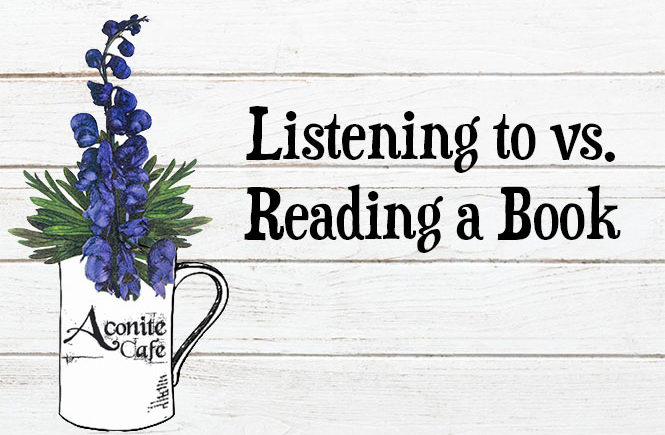As an avid listener of books I’ve heard all too often that “listening is cheating!” or “you can’t count books you listen to”. But to all the nay-sayers and book listeners out there I’m here to say reading is reading no matter the form.
My journey into listening to books started with the discovery of an app called FB Reader. It has a plug to facilitate text to speech, and it has been a reader’s lifesaver. My main excuse for not reading as many books as I did in my younger years was time, who has the time to sit and read a physical book? After many failed attempts to schedule the time, I didn’t think I’d ever get back to where I once was. Listening to books tripled my reading abilities. The big question is, am I getting the same value out of listening to books, as I would be if I physically read them?
Yes. Because science.
This article from The Cult, explains the reading process:
There are two basic processes happening when you’re reading: There is decoding, or translating the strings of letters into words that mean something. And then there is language processing, or comprehension — that is, figuring out the syntax, the story, et cetera. (It’s obviously much more complicated than that; this is what’s known as the “simple view” of reading, but it’s sufficient for thinking about the question at hand.) Researchers have studied the question of comprehension for decades, and “what you find is very high correlations of reading comprehension and listening comprehension,” Willingham said. As science writer Olga Khazan noted in 2011, a “1985 study found listening comprehension correlated strongly with reading comprehension — suggesting that those who read books well would listen to them well. In a 1977 study, college students who listened to a short story were able to summarize it with equal accuracy as those who read it.” Listeners and readers retain about equal understanding of the passages they’ve consumed, in otherwords.
Not convinced?
This article in Time found another study proving yet again, they are equal:
For a 2016 study, Rogowsky put her assumptions to the test. One group in her study listened to sections of Unbroken, a nonfiction book about World War II by Laura Hillenbrand, while a second group read the same parts on an e-reader. She included a third group that both read and listened at the same time. Afterward, everyone took a quiz designed to measure how well they had absorbed the material. “We found no significant differences in comprehension between reading, listening, or reading and listening simultaneously,” Rogowsky says.
Fiction vs. Non-Fiction?
It seems like the minor caveat on physically reading vs. listening might lie in what we are want out of the information. Reading fictions books is for enjoyment, unlike many non-fiction books, where we are reading for a deeper understanding, and to contemplate the material. While comprehension is still above the 50% retention rate, this study posted in The New York Times, tested the difference:
It sounds as if comprehension should be easier when listening than reading, but that’s not always true. For example, one study compared how well students learned about a scientific subject from a 22-minute podcast versus a printed article. Although students spent equivalent time with each format, on a written quiz two days later the readers scored 81 percent and the listeners 59 percent.
What happened? Note that the subject matter was difficult, and the goal wasn’t pleasure but learning. Both factors make us read differently. When we focus, we slow down. We reread the hard bits. We stop and think. Each is easier with print than with a podcast.
So where do you land? Is listening to a book cheating in your mind? Let me know in the comments below. How every you read, don’t let people judge you for it. Reading is reading no matter the form. You are never getting nothing from it.


Leave a Reply